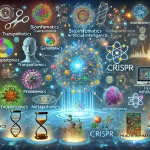
The Future of Cancer Treatment: How AI and Genomic Analysis are Revolutionizing Care
December 28, 2023I. Introduction
Cancer remains one of the leading causes of death worldwide, with an estimated 10 million cancer deaths in 2020 alone. While there have been significant advances in cancer treatments like chemotherapy, radiation, and surgery over the past several decades, many challenges still remain. The heterogeneity and complexity of cancer has made it difficult to develop universal treatments that work for all patients. Additionally, current cancer treatments often come with significant side effects that negatively impact patients’ quality of life.
There is now growing recognition that cancer treatment needs to become more personalized and targeted to the specific molecular characteristics of each patient’s tumor. The field of precision oncology aims to use genomic profiling and big data analytics to understand the molecular drivers of each patient’s cancer and match them to the most effective treatment. Artificial intelligence (AI) and machine learning algorithms have the potential to analyze expansive genomic datasets and identify patterns that can predict treatment response and guide therapeutic decision making.
Personalized cancer treatment enabled by AI and genomics can improve outcomes by ensuring patients receive treatments that specifically target the molecular Achilles heels of their tumors. Targeted therapies and immunotherapies that are tailored to the genetic makeup of each tumor have been shown to shrink tumors and prolong survival more effectively than one-size-fits-all chemotherapy. Precision oncology can also help spare patients from undergoing toxic systemic treatments unlikely to benefit them.
Overall, the convergence of AI, genomics, and other emerging technologies promises to usher in a new era of data-driven, personalized cancer care. Extracting insights from multidimensional omics data and applying machine learning to clinical decision making can help overcome the complexity and heterogeneity of cancer. This has the potential to significantly improve treatment efficacy, survival rates, and quality of life for cancer patients.
II. The Role of AI in Cancer Treatment
Artificial intelligence is poised to transform how cancer is diagnosed and treated. AI refers to the ability of computer systems to perform tasks normally requiring human intelligence, such as visual perception, speech recognition, and decision making. In cancer care, AI is being applied to automate and enhance diagnostic testing, treatment selection, drug development, and more.
One major application is using AI to analyze genomic data from a patient’s tumor to guide therapy selection. Algorithms can rapidly sift through expansive datasets of genomic mutations, gene expression patterns, and protein markers to identify tumor subtypes, predict treatment response, and recommend targeted drugs. For example, IBM Watson has an AI system that analyzes a patient’s genomic profile against scientific literature and drug databases to generate personalized treatment suggestions for clinicians.
AI algorithms are also showing promise in discovering new cancer treatments. Machine learning models can screen thousands of drug combinations to determine which show synergistic effects against cancer cells. Startups like Berg Health are using AI to develop new targeted therapies by uncovering biological and molecular patterns in omics data. Their model identified a promising new drug for pancreatic cancer that is now undergoing clinical trials.
Other emerging AI applications include using computer vision to analyze medical images and detect cancer earlier, leveraging natural language processing to extract information from clinical notes, and applying robotics for more precise surgical procedures. Overall, AI has vast potential to make cancer treatment more predictive, effective, and personalized.
III. Genomic Analysis for Precision Oncology
Advances in genomic sequencing and analysis are helping unlock more personalized approaches to cancer care. Genomic testing examines the complete set of genes and DNA mutations within a tumor to identify its molecular characteristics. This genetic profiling can then guide oncologists to tailor treatment based on the specific vulnerabilities of each patient’s cancer.
For example, genomic testing can detect whether a tumor has mutations that make it susceptible to targeted therapies like PARP inhibitors or immunotherapy. Patients with high microsatellite instability may benefit from checkpoint inhibitor drugs. Testing for biomarkers like HER2 overexpression can indicate if therapies like trastuzumab will be effective.
Comprehensive genomic profiling from companies like Foundation Medicine can match patients to clinical trials for novel therapies aligned to the genomic drivers of their tumors. Analyzing circulating tumor DNA from blood samples can also allow for non-invasive monitoring of how cancers evolve and develop resistance over time.
Overall, genomic sequencing and analysis makes it possible to molecularly decode a patient’s unique cancer and select treatments most likely to drive meaningful responses. Early studies show this genomics-driven approach can improve outcomes for advanced cancers compared to standard chemotherapy. As genomic testing becomes more accessible and integrates with AI-systems, it promises to usher in a new paradigm of data-driven, personalized cancer medicine.
IV. Benefits of AI-Powered Genomic Analysis
The integration of AI algorithms with genomic profiling of tumors offers game-changing advantages for cancer treatment:
- Improved diagnosis and prognosis – AI models can rapidly analyze complex genetic data to detect cancer early and predict its trajectory, enabling faster intervention. Machine learning techniques can also synthesize insights from imaging, lab tests and clinical data for more accurate prognoses.
- Personalized treatment – Matching the genomic profile of a tumor to targeted therapies and clinical trials can significantly improve outcomes compared to one-size-fits-all chemotherapy. AI helps make sense of vast genomic datasets to guide individualized treatment.
- Adaptive therapy – Frequent genomic testing lets oncologists monitor how tumors evolve and adjust treatment in real-time. Liquid biopsies enable non-invasive genomic tracking through a blood test.
- Reduced toxicity – By predicting efficacy and toxicity, AI-powered precision oncology can identify patients unlikely to benefit from chemotherapy and spare them side effects.
- biomarker discovery – Machine learning algorithms can discern protein and genetic biomarkers from omics data that predict treatment response. These biomarkers allow further personalization of therapy.
- Drug development – AI drug discovery platforms like Exscientia use genomics data to identify novel drug targets and accelerate development of new targeted agents.
Overall, the union of human intelligence, AI capabilities, and genomic analysis promises to unlock more effective, adaptive, and patient-centric cancer treatment.
V. Challenges and Limitations
- Privacy/Discrimination – Genomic data reveals sensitive health information. Rigorous data privacy protections are needed to prevent discrimination by insurers or employers.
- Algorithm Bias – AI algorithms can perpetuate biases if trained on imbalanced datasets. Careful evaluation is required to ensure fairness and accuracy.
- Clinical Validation – Most AI models aren’t sufficiently validated for clinical use. More prospective studies are needed to validate real-world safety and efficacy.
- Interpretability – Complex AI models can act as “black boxes”, making it hard to explain their reasoning. Interpretable AI is key for clinicians to trust and adopt these tools.
- Data Siloes – Patient data is scattered across facilities. Data sharing and interoperability is key for compiling diverse training data for AI.
- Inequitable Access – Genomic testing and targeted therapies may not be accessible or affordable for underserved communities. Reimbursement and policies ensuring equitable access are needed.
- Overtesting – Widespread genomic screening may lead to overdiagnosis and overtreatment in low-risk patients. Guidelines are needed to standardize clinically appropriate testing.
While integrating AI and genomics shows promise for revolutionizing cancer care, thoughtfully addressing these challenges and ethical implications will be critical as these technologies continue evolving.

















